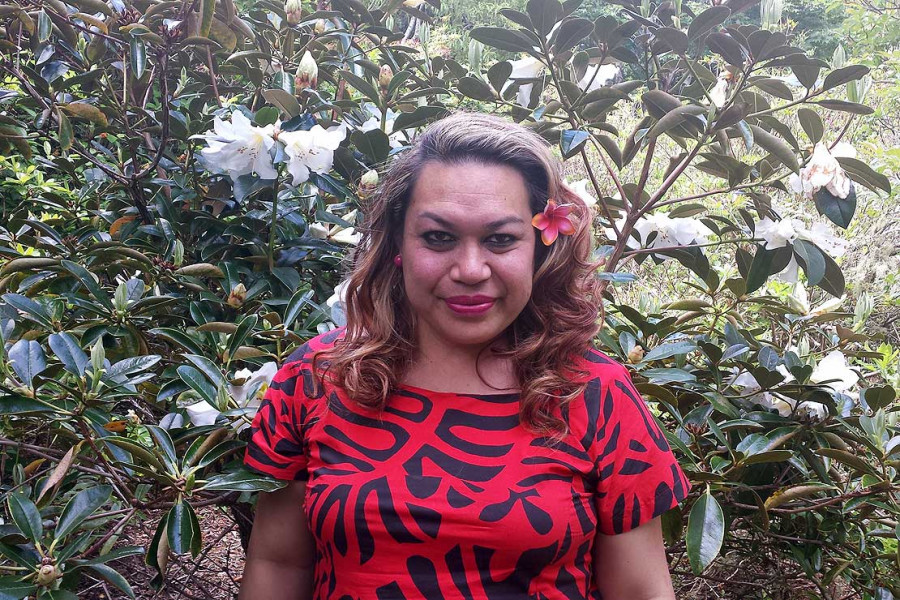Protecting Pacific peoples in MIQ
Protecting Pacific peoples in MIQ

Long-time public servant Dr Angie Enoka (pictured) has a sense of responsibility for the Pacific community in her most recent role working in the Managed Isolation and Quarantine (MIQ) Head Office in New Zealand.
Angie, who graduated with a Doctorate of Philosophy, examining media coverage of New Zealand's Recognised Seasonal Employer or RSE scheme, has worked at several government agencies in her years as a Communications Specialist.
She is currently working for the Ministry of Business, Innovation and Employment (MBIE) using her engagement and media skills to support MIQ, which MBIE is responsible for.
Angie leads the communications regional team supporting the engagement and communications to those currently in managed isolation, the wider community, and the media to help protect New Zealand from COVID-19.
Born and bred in Samoa, Angie first came to Aotearoa on a NZ-funded government scholarship in 1998 to study Journalism at Auckland Institute of Technology (AUT).
“I went back to Samoa in 2001 and returned to New Zealand the following year to do further studies and later found myself working in the public service,” Angie says.
In her role at MIQ, Angie says she is fortunate to be able to provide advice on how best to reach Pacific communities, particularly as MIQ facilities now open up to community cases during the delta outbreak, and Pacific communities are more vulnerable to COVID-19.
“The COVID-19 pandemic continues to impact on a global scale.
“We all know our Pacific population is more susceptible to infection for a variety of reasons, including involvement as frontline or essential workers, multigenerational housing, and disproportionately high levels of underlying co-morbidities including diabetes and cardiovascular disease.
“I feel both a professional and a personal responsibility to improve messaging and engagement for Pacific communities to increase understanding and awareness.”
Angie says everyone has a part to play in protecting our families and loved ones from COVID-19.
“We all owe it to our families to get tested and, if necessary, stay in managed isolation to stop the spread.”
A large part of Angie and her team’s work is collaborating with key partners and relevant agencies to ensure at-risk communities – including Pacific communities – have the right information to ensure they can make informed decisions about their health and wellbeing.
“These partnerships help ensure information comes from trusted sources within Pacific communities and is appropriate and accepted,” she says.
Some Pacific providers have recently raised concerns about the challenges individuals and family members are experiencing in MIQ, including dietary issues, gaining access to essential items, splitting up large families, and reports of increased medical issues while in managed isolation facilities.
“Our MIQ facilities are doing their very best to support those entering MIQ from the community,” Angie says.
“Currently, MIQ is working with Pasifika Futures Limited– the Whānau Ora commissioning agency and other key providers, to help support Pacific individuals and families in MIQ.
“This partnership will help mobilise support especially those needing appropriate health, welfare and cultural support.
Other support systems in place is the provision of information in required languages, and access to on-site translators to help people settle-in at MIQ and support them throughout their stay.
Hotel staff are working very hard to cater for a range of dietary and cultural requirements and have been looking at menu options more suitable for the Pacific community and catering to peoples’ specific needs, Angie says, and MIQ has developed Community Welcome Packs translated in Pacific languages containing information and a helpful list of wellbeing providers people can reach out to if needed.
“We have also developed information sheets and videos in nine Pacific languages including English on what people can expect when they enter MIQ facilities – what to do and not to do when they leave MIQ.
“Additionally, we continue to work alongside key agencies and Pacific community leaders to get this information out to our communities.”
Angie says her time at MIQ has been a learning experience, for everyone involved.
“It is unexpected for a lot of people who have to come into quarantine, however, our staff are doing all they can to meet the varying individual needs of those who need to be isolated in our facilities.
“Operationally, this has been a significant change for facilities and staff and given the range of people in MIQ facilities it is impossible to cater to all individual needs.”
It is easy with COVID-19 to focus on the negative, she adds.
“There have been some considerable success stories by our Pacific people who have been to MIQ, including Pacific providers and frontline workers engaging with Pacific communities and church groups to address concerns and raise awareness.
“Managed Isolation and Quarantine is there for all of us, when we need it – it is a short term stay for a long-term gain.
“The MIQ workers are essential to us all, and they are making sacrifices themselves to look after you.
“Our plea is for people in MIQ to be more patient and understanding to our staff who are all working very hard to accommodate the varying individual needs of returnees and community cases entering our facilities.”
The pause on MIQ room releases will lift on September 20 at 9am NZT (The virtual lobby will open at 8am) for 3,000 rooms across September, October, November and December.
